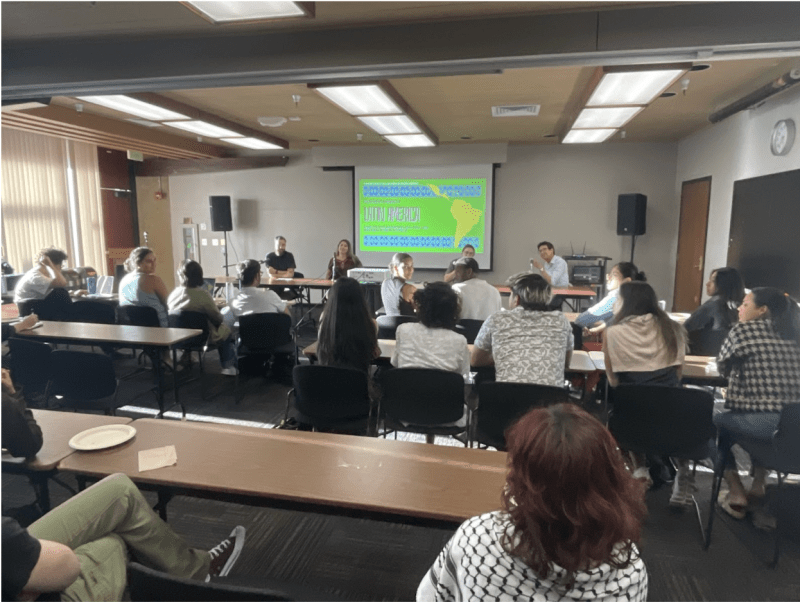Experts encouraged students to view Latin American revolutionary movements through the lenses of power and politics, at a May 30 panel discussion hosted by the Stanford Society for Latin American Politics (SSLAP).
Sitting on the panel were Iberian and Latin American cultures professor Héctor Hoyos, Latin American literature and culture lecturer Ximena Briceño and postdoctoral scholar Javier Mejia. The panel was moderated by Juliana Lamm-Perez ’25, a member of the SSLAP executive team.
SSLAP co-president Isamar Martinez Nunez ’26 said it was important to bring together students and scholars from various disciplines amid ongoing political unrest and instability across Latin America. This year, six Latin American countries — Mexico, Venezuela, Uruguay, El Salvador, Panama, and the Dominican Republic — all elect new presidents. Some of these elections have faced political violence, with 37 candidates assassinated in connection with the recent Mexican election.
“With Latin America’s political landscape becoming increasingly polarized and as we mark the fifth anniversary of the 2019 protests, this panel aims to delve into the causes and consequences of the revolutionary movements of the 19th and 20th centuries and examine their lasting impact on today’s political and socioeconomic conditions,” Nunez said.
Hoyos argued that revolutions in the region have been fueled by inequality, poverty and closure of the traditional political path. Offering the 1910 Mexican Revolution and the 1959 Cuban Revolution as examples, he cited the legacy of Spanish colonialism as a key factor.
Mejia added that another catalyst for revolution was the role of marketing and ties to powerful entities, citing communication theorist Marshall McCluhan’s idea that “the medium is the message.”
“If you think about independence movements, elites connected to Europe made the movement work … so it’s not just about the logistics of channeling money and organizing people … but also being exposed to these international networks,” Mejia said.
Briceño described the power of networks in driving the women-led protests that erupted in Argentina and quickly spread to Mexico, after the brutal rape and murder of a young girl was exposed on Twitter by an activist and journalist in 2016.
“It’s not only necessarily having charismatic leaders … you have to work really hard through these networks and convince people about the demands that you are pushing,” Briceño added.
Latin America has a high degree of online connectivity. Speakers spoke to both the benefits and the harms this poses to the integrity of Latin American systems.
Lamm-Perez noted the prevalence of Russian interference in Latin American politics through social media. “Even though Russia is not a socialist country economically, it still positions itself as a socialist country …. and as an alternative to the U.S,” she said.
Hoyos added that social media algorithms are polarizing, which makes it difficult to gain nuanced perspectives, but acknowledged the potential of social media to equalize differences and give everyone a voice.
Mejia argued that exposure to other cultures through social media has sometimes led individuals in Latin American countries to set unrealistic expectations for economic development and living standards.
But panelists also suggested that exposure to Latin American politics could benefit those within the U.S. Lamm-Perez, who studied abroad in Chile, said she was surprised to learn that perceptions of politics in Latin America often differed dramatically from those in America, especially with regard to Americans’ relative lack of civic engagement.
“Americans see the state as a very external actor … and we never see it as the duty of the government to make change,” she said. “We can gain a lot from Chile and other Latin American countries.”
Hoyos added that the exchange of ideas from Latin America to the U.S. is significant and underlooked.
“We always think that the world wants to become like the U.S.,” he said. But American social justice movements have also gained inspiration from Latin America: Hoyos pointed to the Chicano movement, which drew from the Mexican Revolution, and the Black Panthers, which looked to the Cuban Revolution.
Hoyos encouraged attendees to seek nuanced perspectives for informed discourse and meaningful societal transformation.
“Embrace complexity and own it,” he told the audience.
